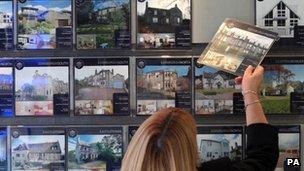Strong start for Help to Buy, say lenders
- Published

House prices in the UK have returned to their pre-crisis levels according to some figures
Two major lenders have reported a strong uptake in the first month of the government's extended Help to Buy mortgage guarantee scheme.
Royal Bank of Scotland (RBS) and Halifax said they had received a total of 2,384 applications, potentially worth £365m in mortgages.
The scheme is designed to encourage lenders to offer mortgages with deposits as low as 5%.
But critics are concerned it could help to create a UK housing bubble.
RBS and its subsidiary NatWest, and Halifax - owned by Lloyds Banking Group - are among the few lenders to offer mortgages under the government's extended scheme.
HSBC and Barclays are planning to offer such mortgages in the future, but Nationwide, the UK's second largest lender, has not yet made a decision.
The first phase of Help to Buy was launched in April, but only provided help to first-time buyers buying new-build homes. The extended scheme applies to all buyers and all types of homes, up to a value of £600,000.
Under this part of the scheme, up to 15% of the value of the loan will be guaranteed by the Treasury.
RBS said it had so-far approved 169 of its 1,075 applications, and five customers had already completed their purchases.
It said the majority of applications had come from young couples with a joint salary of less than £50,000. The average price of the property being bought was £167,565.
'Already delivering'
David Cameron says the Help to Buy scheme has "got off to an extraordinary start"
Unlike the first part of the Help to Buy Scheme, part two also offers help to existing home owners.
However, Halifax said more than 80% of the applications it had received under the scheme were from first-time buyers, while RBS/NatWest said it was 73%.
RBS said the majority of applications had come from outside London and the south-east of England, where property prices are rising fastest.
It also said that five purchases had so far been completed.
The government welcomed the figures, saying the scheme was supporting "responsible lending", helping borrowers who could afford mortgage repayments, but not a large deposit.
"Four weeks in and its clear that Help to Buy is already delivering," said Prime Minister David Cameron.
"Most Help to Buy applicants are first-time buyers, young and have a roughly average household income. This is all about helping hardworking people get on the first rung of the property ladder."
Bubble Worries
Shadow Chief Secretary to the Treasury Chris Leslie says "affordability will just be a mirage" under Help to Buy
But critics have expressed concern that the scheme could create a bubble in the housing market, making home affordability an even bigger problem.
Chris Leslie, the shadow chief secretary to the Treasury, said: "If the government was serious about helping first-time buyers they would also be bringing forward investment to build more affordable homes.
"Rising demand for housing must be matched with rising supply, but under this government house building is at its lowest level since the 1920s," he said.
Labour says that the Bank of England should review the scheme immediately, rather than waiting for a year.
The latest figures from the Office for National Statistics suggest average house prices in the UK are at a record level.
Other measures suggest house prices and housing transactions are well short of the pre-crisis peak.
Figures from Halifax suggest house prices are well below what they were in 2007, but have risen steadily for the last nine consecutive months.
The Nationwide Building Society says prices are currently 5.8% higher than a year ago.
But estate agents argue that much of those price rises are seen in London and the south-east of England, while prices in other parts of the country are rising more slowly, or in some cases actually falling.
The housebuilder Redrow reported that 35% of its sales since June have been under the first part of the government's Help to Buy scheme.